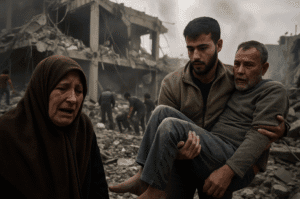Escalating Gaza Conflict: 5 Shocking Ways Humanity Is Being Tested Amid War and Diplomacy Failure
Israel’s mobilization of tens of thousands of reservists signals a perilous escalation in Gaza, as diplomatic efforts to revive a ceasefire collapse under Prime Minister Netanyahu’s criticism of mediator Qatar. With stalled negotiations, Hamas continues psychological warfare, releasing footage of an injured Israeli-Russian hostage, while Israeli airstrikes kill civilians—including infants—deepening Gaza’s humanitarian crisis. Domestic protests in Tel Aviv reveal growing public frustration over Netanyahu’s prioritization of military action over hostage safety, even as his far-right allies push for harster measures.
Gaza’s 2.3 million residents now face catastrophic shortages, with aid blocked since March and UN warnings of famine. The conflict’s toll—over 52,000 dead, widespread destruction, and shattered civilian lives—underscores a grim reality: military strategies risk entrenching cycles of violence without clear paths to peace. Meanwhile, families of hostages and victims plead for leaders to prioritize humanity over ideology, as the world watches a crisis with no end in sight.

Escalating Gaza Conflict: 5 Shocking Ways Humanity Is Being Tested Amid War and Diplomacy Failure
As Israel mobilizes tens of thousands of reservists for an expanded offensive in Gaza, the stakes of the 20-month war grow increasingly dire, exposing fractured diplomacy, deepening humanitarian suffering, and a precarious path forward for both hostages and civilians caught in the crossfire.
Military Buildup Signals Prolonged Conflict
Reports of reservist call-ups, confirmed by families of AFP journalists, suggest Israel is preparing for intensified urban combat in Gaza. This follows the collapse of a two-month ceasefire in March and stalled negotiations mediated by Qatar, Egypt, and the U.S. The Israeli security cabinet’s pending approval of expanded operations underscores Prime Minister Netanyahu’s commitment to a military solution, despite mounting international criticism and domestic dissent. Analysts warn that redeploying troops from the West Bank to Gaza risks destabilizing another flashpoint, potentially igniting broader regional unrest.
Netanyahu’s Qatar Critique: A Blow to Mediation
Netanyahu’s public rebuke of Qatar—accusing the Gulf state of enabling Hamas through “double talk”—marks a sharp deterioration in relations with a key mediator. Qatar, which hosts Hamas’ political leadership and previously brokered hostage releases, now faces pressure to prove its neutrality. The rhetoric reflects Netanyahu’s balancing act: appeasing far-right coalition partners demanding Hamas’ eradication while alienating intermediaries critical to hostage diplomacy. This tension leaves families of captives, like Russian-Israeli Maxim Herkin (shown in a recent Hamas video), fearing their loved ones are becoming pawns in a deadly stalemate.
Human Toll: “Prisoner 24” and the Youngest Victims
The release of footage showing Herkin, bandaged and pleading for government action, highlights the agony of hostage families. Hamas’ psychological warfare—releasing timed videos—amplifies pressure on Israel’s leadership. Meanwhile, Gaza’s civilian toll continues to climb. A pre-dawn strike in Khan Yunis killed 11, including three infants under one year old, underscoring the conflict’s indiscriminate brutality. Local rescuers described sifting through rubble by hand, a testament to depleted resources after months of blocked aid.
Domestic Unrest: Protests and Moral Dilemmas
Thousands of Israelis protested outside Tel Aviv’s defense ministry, demanding urgent hostage negotiations. Demonstrators like Arona Maskil argue the offensive endangers captives, reflecting growing public skepticism toward Netanyahu’s “total victory” narrative. Conversely, right-wing factions push for harsher measures, leaving the government torn between competing moral imperatives: saving lives or eliminating Hamas.
Humanitarian Collapse Looms
With Israel blocking all aid since March, Gaza’s 2.3 million residents face catastrophic shortages of food, medicine, and fuel. UN agencies warn of looming famine, particularly in northern Gaza, where infrastructure lies in ruins. The military’s focus on dismantling Hamas tunnels and strongholds risks further displacing civilians, many already sheltering in makeshift tents.
The Road Ahead: Few Good Options
The conflict’s escalation presents no clear exits. Military pressure may weaken Hamas but risks entrenching cycles of retaliation. Diplomacy remains hamstrung by mutual distrust, while civilians pay the highest price. For families of hostages and victims, the path forward hinges on leaders prioritizing humanity over ideology—a prospect that grows dimmer with each airstrike.
As the world watches, the Gaza war becomes a grim test of how much suffering a population can endure and how far a government will go in the name of security. The absence of easy answers only deepens the tragedy.
You must be logged in to post a comment.